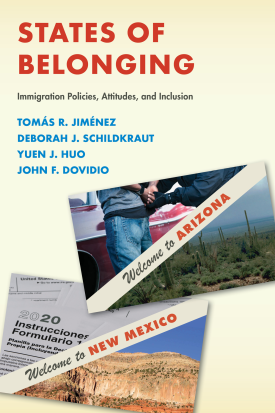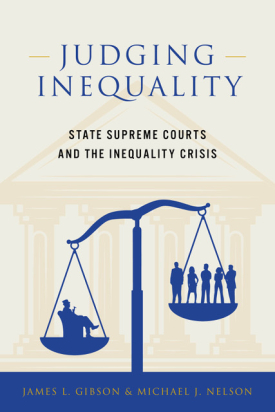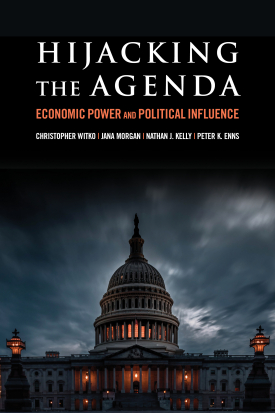While there is evidence regarding discrimination against Muslims, few studies focus on reducing it. Research from behavioral economics, psychology, and political science suggests that conversation-based interventions may reduce prejudice against out-groups, at least in the short term. Economist Yan Chen, political scientist Ann Lin, and computer scientist Kentaro Toyama will analyze and compare the effects of two conversation-based interventions in a randomized online experiment, using a representative sample of the U.S. population.
Co-funded with the Carnegie Corporation of New York

States of Belonging
About This Book
Winner of the 2022 Otis Dudley Duncan Award for Outstanding Scholarship in Social Demography from the Population Section of the American Sociological Association
2022 Honorable Mention for the Latino Politics Best Book Prize from the Latino Caucus of the American Political Science Association
“Bringing together the wisdom of sociology, political science, and psychology, States of Belonging finds that state level policies towards immigrants can affect a sense of belonging not only for immigrants but for native-born citizens as well. Utilizing state of the art mixed empirical methods including surveys, experiments, and in-depth interviews, this brilliant study shows that state level policies can have far reaching consequences. The surprising lessons these authors draw from Arizona and New Mexico are important ones for all Americans.”
—Mary C. Waters, PVK Professor of Arts and Sciences and the John L. Loeb Professor of Sociology, Harvard University
“States of Belonging is a stellar example of collaborative social science research, bringing together experts from sociology, political science, and social psychology to address a critical policy question: How do a state’s immigration policies affect the lived experience of its residents, both immigrant and U.S.-born? Focusing on Arizona and New Mexico as two contrasting immigration climates, the authors smoothly and skillfully weave together historical context, contemporary policies, experimental data, and subjective reports to show how specific state policies, immigration attitudes, and a personal sense of belonging to state and nation are closely intertwined. Their conclusion that a desire for shared citizenship outweighs presumed differences based on political party or ethnic group is an important message for us to hear, and their case for immigration reform is persuasive and timely.”
—Kay Deaux, Distinguished Professor Emerita, Graduate Center, City University of New York
“If you’ve ever desired a book about immigrant incorporation that is psychologically nuanced, sociologically informed, and politically relevant, States of Belonging is the book for you. Gracefully written by a quartet of leading social scientists, this book provides us with new and revealing insights about the sense of belonging experienced by immigrants and their descendants—and the essential role that individual states play in this process through their own responses to immigration. What is more, they show readers that non-Hispanic whites are also significantly impacted by the degree to which immigrants and their families are welcomed or not by their own state, thus demonstrating a more complicated and often overlooked dynamic in white-Latino relations. Methodologically meticulous and displaying an impressive theoretical range, this volume is likely to change many minds about the extent to which the incorporation of immigrants has implications for us all. It certainly changed mine.”
—Efrén Pérez, Professor of Political Science and Psychology, UCLA
Political turmoil surrounding immigration at the federal level and the inability of Congress to pass comprehensive immigration reform have provided an opening for state and local governments to become more active in setting their own immigration-related policies. States largely dictate the resources, institutions, and opportunities immigrants can access: who can get a driver’s license or attend a state university, what languages are spoken in schools and public offices, how law enforcement interacts with the public, and even what schools teach students about history. In States of Belonging, an interdisciplinary team of immigration experts—Tomás R. Jiménez, Deborah J. Schildkraut, Yuen J. Huo, and John F. Dovidio—explore the interconnections among immigration policies, attitudes about immigrants and immigration, and sense of belonging in two neighboring states—Arizona and New Mexico—with divergent approaches to welcoming newcomers.
Arizona and New Mexico are historically and demographically similar, but they differ in their immigration policies. Arizona has enacted unwelcoming policies toward immigrants, restricting the access of immigrants to state resources, social services, and public institutions. New Mexico is more welcoming, actively seeking to protect the rights of immigrants and extending access to state resources and institutions. The authors draw on an original survey and in-depth interviews of a cross-section of each state’s population to illustrate how these differing approaches affect the sense of belonging not only among immigrants, but among the U.S.-born as well.
Respondents in Arizona, regardless of whether they were foreign- or native-born or their ethno-racial background, agreed that the state is unwelcoming to immigrants, and they pointed to Arizona’s restrictive policies as the primary factor. The sense of rejection perceived by Latinos in Arizona, including the foreign-born and the U.S.-born, was profound. They felt the effects of administrative and symbolic exclusions of the state’s unwelcoming policies as they went about their daily lives.
New Mexico’s more welcoming approach had positive effects on the Latino immigrant population, and these policies contributed to an increased sense of belonging among U.S.-born Latinos and U.S.-born whites as well. The authors show that exposure to information about welcoming policies is associated with an improved sense of belonging across most population groups. They also find that the primary dividing line when it came to reactions to welcoming policies was political, not ethno-racial. Only self-identified Republicans, Latino as well as white, showed reduced feelings of belonging.
States of Belonging demonstrates that welcoming policies cultivate a greater sense of belonging for immigrants and other state citizens, suggesting that policies aimed at helping immigrants gain a social, economic, and political foothold in this country can pay a broad societal dividend.
TOMÁS R. JIMÉNEZ is professor of sociology at Stanford University.
DEBORAH J. SCHILDKRAUT is pro-fessor of political science at Tufts University.
YUEN J. HUO is professor of psychology at the University of California, Los Angeles.
JOHN F. DOVIDIO is Carl I. Hovland Professor Emeritus and research professor of psychology at Yale University.
Download
RSF Journal
View Book Series
Sign Up For Our Mailing List
Apply For Funding

Judging Inequality
About This Book
Winner of the C. Herman Pritchett Book Award from the American Political Science Association
Winner of the Virginia Gray Book Award from the State Politics and Policy Section of the American Political Science Association
“Judging Inequality is an extraordinary achievement. In this empirical tour de force of exceptional transparency using massive new data sets, Gibson and Nelson have produced a seminal and indispensable work on state supreme courts replete with nuanced, compelling, and sometimes surprising results. Bravo!”
—Melinda Gann Hall, Professor of Political Science, MSU Distinguished Faculty Award Winner, and College of Law Faculty Affiliate, Michigan State University
“For too long, political scientists have paid little attention to the state courts relative to their importance in U.S. politics and policy. This pathbreaking book and data by James Gibson and Michael Nelson should ignite such attention. In Judging Inequality, the authors analyze six thousand cases to present compelling evidence on how judicial institutions and judges’ back-grounds shape inequality in the United States today.”
—Brandice Canes-Wrone, Donald E. Stokes Professor of Public and International Affairs and Professor of Politics, Princeton University
“A pathbreaking, first-of-its-kind study of how U.S. state law and courts—purportedly closer to the people themselves than the U.S. Supreme Court—effectively shield powerful economic interests from popular calls for equality and redistribution, Judging Inequality is an exemplary work of social science. James L. Gibson and Michael J. Nelson’s masterful yet sobering account is a must-read for anyone who harbors hopes for addressing inequality challenges that have plagued American society for generations through strategic litigation at the state court level.”
—Ran Hirschl, Professor of Government and Earl E. Sheffield Regents Chair in Law, University of Texas at Austin
Social scientists have convincingly documented soaring levels of political, legal, economic, and social inequality in the United States. Missing from this picture of rampant inequality, however, is any attention to the significant role of state law and courts in establishing policies that either ameliorate or exacerbate inequality. In Judging Inequality, political scientists James L. Gibson and Michael J. Nelson demonstrate the influential role of the fifty state supreme courts in shaping the widespread inequalities that define America today, focusing on court-made public policy on issues ranging from educational equity and adequacy to LGBT rights to access to justice to worker’s rights.
Drawing on an analysis of an original database of nearly 6,000 decisions made by over 900 judges on 50 state supreme courts over a quarter century, Judging Inequality documents two ways that state high courts have crafted policies relevant to inequality: through substantive policy decisions that fail to advance equality and by rulings favoring more privileged litigants (typically known as “upperdogs”). The authors discover that whether court-sanctioned policies lead to greater or lesser inequality depends on the ideologies of the justices serving on these high benches, the policy preferences of their constituents (the people of their state), and the institutional structures that determine who becomes a judge as well as who decides whether those individuals remain in office.
Gibson and Nelson decisively reject the conventional theory that state supreme courts tend to protect underdog litigants from the wrath of majorities. Instead, the authors demonstrate that the ideological compositions of state supreme courts most often mirror the dominant political coalition in their state at a given point in time. As a result, state supreme courts are unlikely to stand as an independent force against the rise of inequality in the United States, instead making decisions compatible with the preferences of political elites already in power. At least at the state high court level, the myth of judicial independence truly is a myth.
Judging Inequality offers a comprehensive examination of the powerful role that state supreme courts play in shaping public policies pertinent to inequality. This volume is a landmark contribution to scholarly work on the intersection of American jurisprudence and inequality, one that essentially rewrites the “conventional wisdom” on the role of courts in America’s democracy.
JAMES L. GIBSON is Sidney W. Souers Professor of Government at Washington University in St. Louis and Professor Extraordinary in Political Science, Stellenbosch University, South Africa.
MICHAEL J. NELSON is Jeffery L. Hyde and Sharon D. Hyde and Political Science Board of Visitors Early Career Professor in Political Science and associate professor of political science at the Pennsylvania State University.
RSF Journal
View Book Series
Sign Up For Our Mailing List
Apply For Funding

Hijacking the Agenda
About This Book
Winner of the 2022 Gladys M. Kammerer Award from the American Political Science Association
“Hijacking the Agenda should have a big impact on how we think about Congress, policymaking, and political inequality. It provides an ambitious and creative analysis of an often-overlooked dimension of political power—the outsized role of the wealthy and well-organized in determining whose problems get addressed and whose get ignored.”
—Larry M. Bartels, May Werthan Shayne Chair of Public Policy and Social Science, Vanderbilt University
“To know who governs, we must know who controls the governing agenda. In this innovative book, four top political scientists show that the congressional agenda is disproportionately shaped by economic elites and the politicians most friendly to and funded by them. Combining sophisticated quantitative analysis and compelling case studies, Hijacking the Agenda sets a new standard for research on inequality and American democracy—and sounds a loud warning that all scholars and citizens should hear.”
—Jacob Hacker, Stanley Resor Professor of Political Science, Yale University
Why are the economic concerns of lower- and middle-class Americans so often ignored by Congress, while the economic goals of the wealthiest are prioritized, often resulting in policies promoting their interests? In Hijacking the Agenda, political scientists Christopher Witko, Jana Morgan, Nathan J. Kelly, and Peter K. Enns examine why Congress privileges the concerns of businesses and the wealthy over those of average Americans. They go beyond demonstrating this bias to document how and why economic policy is skewed in favor of the rich.
The authors analyze over 20 years of floor speeches by thousands of members of Congress to examine how campaign contributions and independent expenditures on behalf of candidates help set the national economic agenda. They find that legislators receiving more support from business and other wealthy interests were more likely to discuss the deficit and other upper-class priorities, while those receiving more assistance from unions were more likely to discuss issues important to the lower and middle class, such as economic inequality and wages. This attention imbalance matters because when members of Congress talk about certain issues, their speech is often followed by legislative action. While unions use their resources to push back against wealthy interests, spending by the wealthy dwarfs that of unions, often giving the upper class the upper hand.
The authors use case studies analyzing financial regulation and the minimum wage to demonstrate how the economic power of the wealthy enables them to advance their agenda. In each case, the authors examine structural power, or the power that comes from a group’s economic position, and kinetic power, the power that comes from the ability to mobilize organizational and financial resources in the policy process. They show how business uses its structural power and resources to effect policy change in Congress, as when the financial industry in the late 1990s promoted passage of a bill that eviscerated financial regulations put in place after the Great Depression. Likewise, when business wants to preserve the status quo, it uses its power to keep issues off of the legislative agenda, as when inflation erodes the value of the minimum wage and its declining purchasing power leaves minimum-wage workers in poverty. Although groups representing lower- and middle-class interests, particularly unions, are sometimes able to shape policy if conditions are right, they lack structural power and have limited financial resources. As a result, the wealthy have considerable advantages in the policy process, advantages that only intensify as their economic power becomes more concentrated and policymakers continue to see policies beneficial to business as beneficial for all.
Hijacking the Agenda is an illuminating account of the way economic power influences the congressional agenda and policy process to privilege the wealthy and marks a major step forward in understanding the politics of inequality.
CHRISTOPHER WITKO is professor of public policy and political science and associate director of the School of Public Policy at Pennsylvania State University.
JANA MORGAN is professor of political science at the University of Tennessee.
NATHAN J. KELLY is professor of political science at the University of Tennessee.
PETER K. ENNS is professor of government at Cornell University and executive director of the Roper Center for Public Opinion Research.
Download
RSF Journal
View Book Series
Sign Up For Our Mailing List
Apply For Funding
To what extent have our political institutions been damaged by the events surrounding the 2020 election? Political scientist James Gibson will assess the election’s consequences based on several surveys, beginning in July 2020. RSF funds will be used for a third nationally representative survey to be fielded in February 2021, that will assess changes in attitudes toward the president/presidency, the Supreme Court, and the Senate from prior to the election through the immediate post-election period and concluding in the post-inauguration period.
Political scientist Matthew Baum and his colleagues hypothesize that the COVID-19 pandemic will permanently change the trajectory of our social, economic, and political systems. They will conduct two additional monthly surveys in a series of state surveys conducted since April 2020 with previous NSF support. The January and March 2021 monthly waves will capture opinions, behaviors, and circumstances in the post-election period.
Pagination
- Previous page
- Page 11
- Next page
